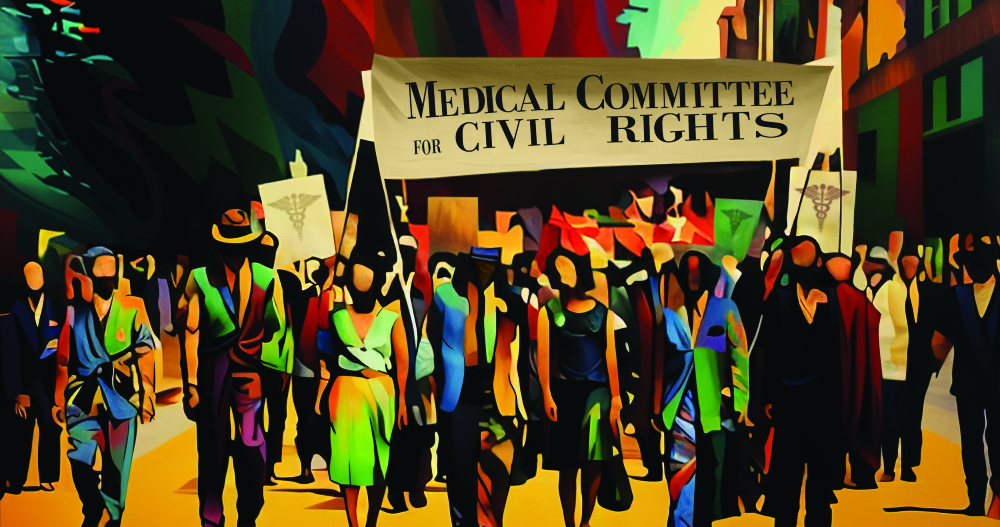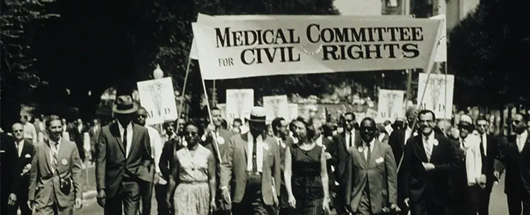
Black History Month: The Community Health Movement and the Road Ahead

February marks Black History Month, a time to reflect on the struggles, achievements, and ongoing progress in the fight for equity and justice. For Marin City Health and Wellness Center (MCHWC), this is an opportunity to recognize the history of the community health movement, how it has shaped access to care, and the work that remains to be done.
The Beginnings of the Community Health Movement
The community health movement in the United States emerged during the civil rights era, deeply intertwined with the broader struggle for racial and economic justice. One of the most pivotal moments was the establishment of the Office of Economic Opportunity (OEO) by President Lyndon B. Johnson in 1964. This office was a cornerstone of Johnson’s War on Poverty, providing funding and support to programs that sought to address systemic inequality. Among these programs was the development of community health centers, which would serve low-income and underserved populations.
A year before the OEO’s founding, in 1963, the Medical Committee for Civil Rights (MCCR) was formed by a group of physicians and medical professionals committed to fighting racial discrimination in healthcare. This committee played a crucial role in advocating for desegregation in hospitals and medical schools, as well as expanding healthcare access in Black communities. The work of MCCR set the stage for greater systemic changes, highlighting the need for community-driven healthcare solutions.
The First Community Health Centers: A Model for Change
The first federally funded community health centers were established in the mid-1960s, serving as a groundbreaking model for public health. Among the earliest was the Tufts-Columbia Point Health Center in Dorchester, Massachusetts. Founded in 1965, this center was the first of its kind, built on the principle that healthcare should be community-based, comprehensive, and accessible to all. Columbia Point set the precedent for community health centers across the country, demonstrating how local clinics could provide high-quality, preventive care to the historically marginalized.
Dr. Jack Geiger, a key figure in the community health movement, was instrumental in launching Columbia Point and later the Delta Health Center in Mound Bayou, Mississippi. These centers pioneered the concept of social determinants of health—recognizing that factors such as housing, employment, and education were integral to overall well-being. The success of these early health centers proved that community-driven healthcare could be a powerful tool for addressing disparities.
The Role of the National Association of Community Health Centers
The National Association of Community Health Centers (NACHC), of which MCHWC is a member, was established in 1971 to support and advocate for community health centers nationwide. As the leading organization representing over 1,400 community health centers, NACHC has been a driving force in securing federal funding, shaping health policy, and ensuring that community health centers remain sustainable.
NACHC’s efforts have helped expand the reach of community health centers, which now serve over 30 million people across the U.S. These centers provide comprehensive care regardless of a patient’s ability to pay, offering services such as primary care, dental care, behavioral health, and substance use treatment.
One of NACHC’s key initiatives is the annual Policy & Issues Forum (P&I), a gathering that brings together healthcare leaders, policymakers, and advocates. This event serves as a platform for discussing pressing issues facing community health centers and shaping policies that impact their future.
MCHWC’s Commitment to the Community Health Movement
MCHWC is deeply rooted in the values of the community health movement. Founded with a mission to provide culturally appropriate healthcare to underserved populations, we continue to advocate for health equity and access, as well as policies that strengthen community health centers, secure funding, and address the evolving challenges in public health.
Our holistic approach to care aligns with the foundational principles of the first community health centers—addressing not just medical needs but also the broader social determinants of health.
Looking to the future: goals and challenges
While significant progress has been made, challenges remain. The COVID-19 pandemic underscored the persistent disparities in healthcare access and outcomes for Black communities. Issues such as chronic disease management, mental health services, and maternal health continue to disproportionately affect communities of color. Additionally, workforce shortages and funding uncertainties threaten the stability of many community health centers.
Going forward, the community health movement must continue to adapt and innovate. Advocacy at the state and federal levels is crucial to securing sustainable funding, expanding telehealth services, and integrating new care models. Programs that address health literacy, economic opportunity, and preventive care will be vital in closing the equity gap.
As we observe Black History Month, it is essential to honor the legacy of those who fought for health equity and to recognize the ongoing work required to achieve true health justice. The community health movement, born out of the civil rights era, remains a beacon of hope and progress. Marin City Health & Wellness Center stands at the forefront of this effort, carrying forward the mission of ensuring that all individuals—regardless of race, income, or background—have access to high-quality, compassionate care.
With strong leadership, dedicated advocacy, and a commitment to community-driven solutions, the future of community health centers remains bright. By continuing to push for systemic change, we can build a healthcare system that serves everyone.
About MCHWC
Marin City Health and Wellness is a community health clinic serving Marin and San Francisco Counties, providing innovative health and wellness services to all, with the goal of African American health equity.
Make your appointment today by calling (415) 339-8813.

Medical Committee for Civil Rights at the March on Washington, 1963
National Library of Medicine #101455945


